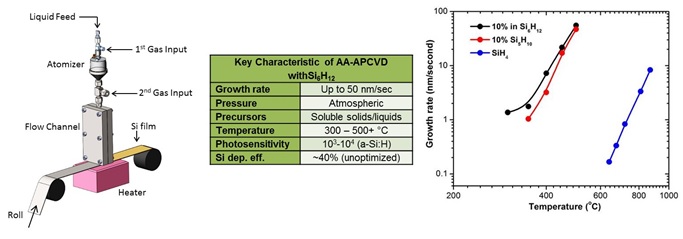Roll-to-Roll Synthesis of Silicon Thin Films from Liquid Silanes (RFT-447)
Invention Summary
Silicon thin films are fundamental in solar and microelectronic industries, and are presently obtained using expensive low-pressure plasma enhanced chemical vapor deposition (PECVD) using gaseous silanes despite of its low precursor utilization efficiency. Instability and low vapor-pressure of liquid hydrosilanes have limited their use in the semiconductor industries for longtime. Researchers at NDSU have developed a process to synthesis silicon thin films from liquid hydrosilane (Si6H12) at ambient pressure in a roll-to-roll method using atmospheric pressure aerosol assisted chemical vapor deposition (AA-APCVD) that has higher deposition rates compared to the state-of-the-art PECVD. Solubility of solid dopants in the liquid hydrosilane facilitate the deposition of degenerately doped (n & p –type) Si thin films opposed to compressed toxic phosphine and borane gases used in other techniques. Low decomposition temperature (higher activation energy) of cyclohexasilane (Si6H12), a liquid hydrosilane, benefits for a new plasma-free process for the synthesis of silicon nitride films and Si nanowires (with suitable catalyst) at temperatures as low as 350oC using the AA-APCVD, readily adoptable for large-scale roll-to-roll continuous manufacturing. Liquid hydrosilane compositions consisting of nanomaterials enable hybrid Si films with embedded nanomaterials that have applications in energy harvesting and light emitting devices.

Benefits
- Roll-to-roll, ambient pressure, low temperature, high deposition rate
- Soluble dopants allow degenerately doped Si thin films without PH3 and B2H
- Plasma free synthesis of a-SiNx thin films
- Vapor-Liquid-Solid based growth of Si nanowires and nanomaterials embedded Si thin films
Applications
These inventions have applicability in photovoltaics, microelectronics, Li-ion batteries (anode), optoelectronic devices and biomedical market.
Patents
This technology is the subject of the Issued US patent 9914998 and is available for licensing.
Contact
NDSU Research Foundation
info(at)ndsurf(dot)org
(701)231-8173
NDSURF Tech Key
RFT, 447, RFT447
Inquire about this technology >